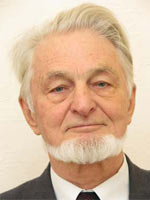Informational society and Russia. Strategies of development
Basic Division: Department of Philosophy.
Brief Description of Research Activities
The researchers of the trend explore the new stage of social development – Post-industrial or Informational society. They analyse its different interpretations, prove the suggested concept of the Post-industrial society as the late capitalism, full of the tendencies to transit to another social and economic structure. They analyse the social and economic reforms in Russia and tendencies of deindustrialization. The researchers develop the principles of Russia’s transition to informational society.
Selected publications characterising Scientific Research Trend
1. Orlov V. Vasilieva T. Philosophy of Economy. Perm. PSU. 2005, 2006. p. 266
2. Orlov V. Philosophy and Political Economy / Philosophy and Society. 1999. Issue 2. p.229-239
3. Orlov V. The future of Russia. Strategy of development / New Ideas in Philosophy. Perm, PSU. 2005. Issue 14(1). P. 5-20
4. Orlov V. Problem of industrial stricture in post-industrial society / New Ideas in Philosophy. Perm, 2008. Issue 17(1). p. 4-10
5. Orlov V. Theory of post-industrial society and labour paradigm in Social Philosophy / Bulletin of Perm University. Series: Philosophy, 2009. Issue 5(31) p. 4-10
6. Loskutov Y. Post-industrial society and morality / Perm University Herald. Philosophy, 2009. Issue 5(1) p. 32-37
7. Gritsenko V. Theory of post-industrial society in modern foreign science. Perm. PSU. 2010. p.204
8. Orlov V. Informational society, crisis and Russia / New Ideas in philosophy. Perm, 2008. Issue 18(1) p. 5-19
The Most Significant Programmes, carried out within Scientific Research Trend
1. Russian Humanitarian Sciences Foundation. Regional competition. 2002-2004. Programme № 02-03-00164 а/Т “Philosophy of economy”
2.Russian Humanitarian Sciences Foundation. 2008-2009. Programme № 08-03-82301 а/у “Informational society and Russia. Strategies of development”.
3. Order. 2011-2013. Programme № 1.13.11 “Philosophy as innovative factor of science and education”




